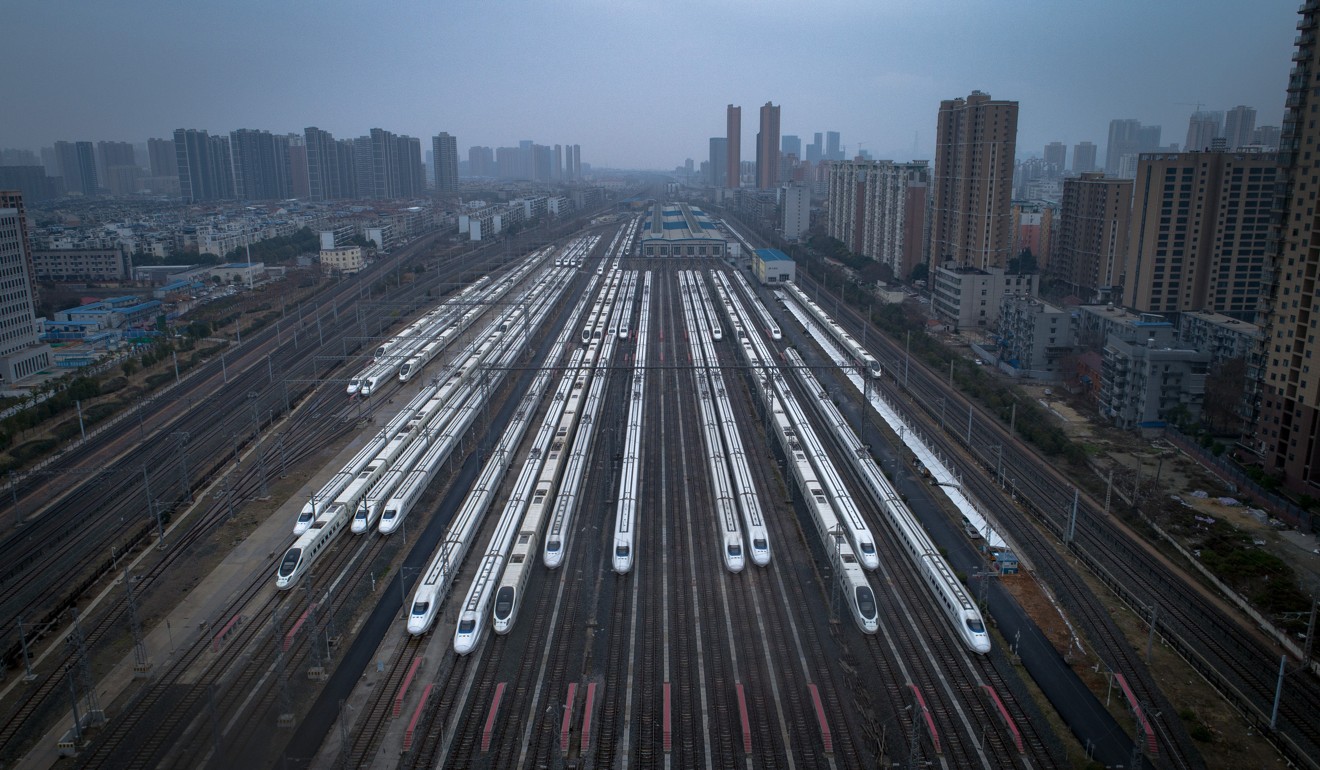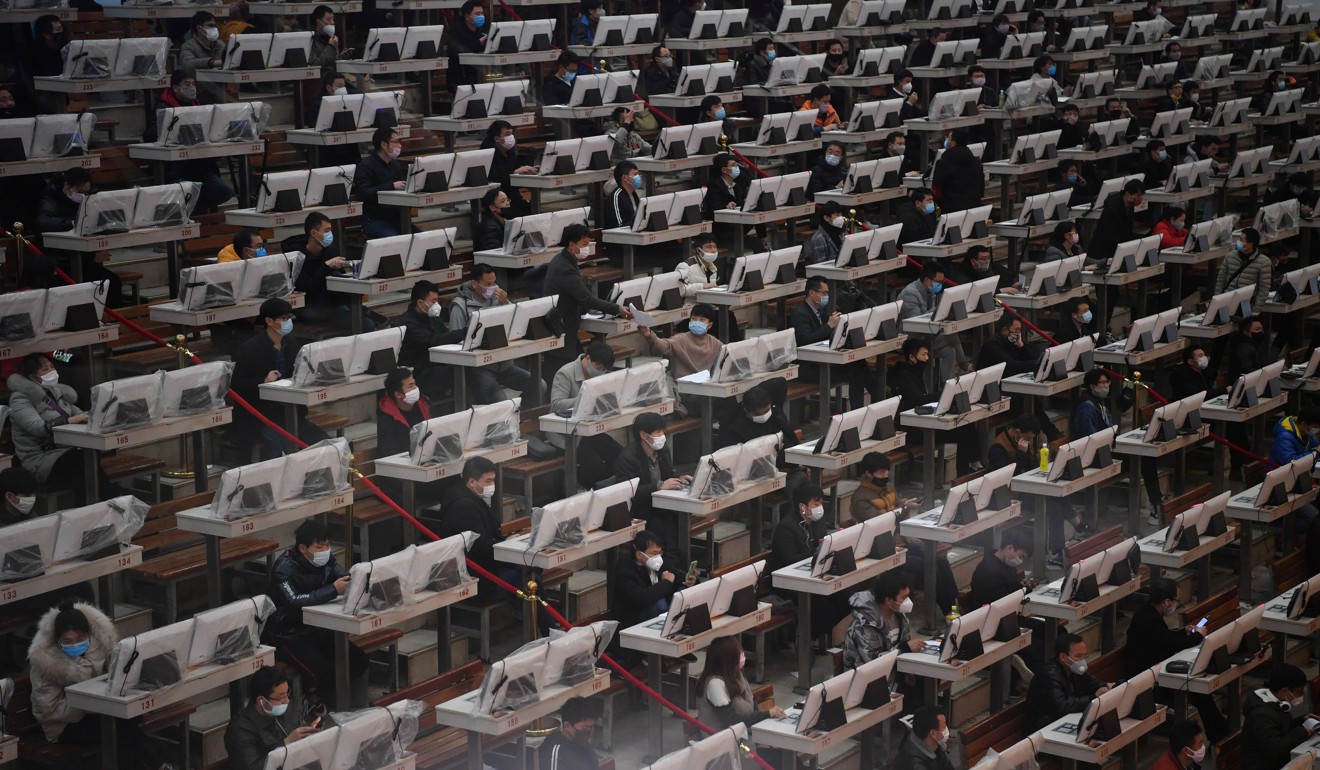Forget Sars, the new coronavirus threatens a meltdown in China’s economy
- Sars’ fatality rate may be higher than Covid-19’s, but economically speaking the new coronavirus is far more deadly
- This time around, a worst-case scenario of financial collapse, foreign exodus and large-scale bankruptcy cannot be ruled out

Given the rapid advance of medical science and globalisation of recent decades, the scale, spread and economic costs of human epidemics are rocketing up, even if fatality rates are starting to fall.
Never before has China paid such an economic price for an epidemic as it has done already with the coronavirus, which originated in the Chinese city of Wuhan and causes the disease now officially known as Covid-19. And the damage is spreading.
It is too soon to assess the full impact of the virus as the data changes day after day and not even the brightest expert can say with any certainty when the outbreak might end. Nevertheless, that has not stopped economists from attempting to forecast the likely economic cost based on precedents such as the 2003 outbreak of severe acute respiratory syndrome, or Sars.
Sars sickened about 8,000 people and killed fewer than 800 and in these terms has already been surpassed by the new coronavirus, though its fatality rate of 9.6 per cent is significantly higher than that of Covid-19, which some estimates put at around 2.4 per cent. Sars cut two percentage points from China’s real GDP growth in the second quarter of 2003 and caused US$50 billion of damage to the global economy.
Of course, the economic losses from Covid-19 will depend somewhat on how long the outbreak lasts and on what policy support the Chinese government comes up with to offset the impact. But even at this stage, it is obvious that the economic impact of Covid-19 will be far more severe than that of Sars, or any other previous epidemic, for a number of reasons.
Firstly, the Chinese economy is four times as big as it was in 2003, so its losses and the impact on the global economy are likely to be correspondingly larger. China’s gross domestic product accounted for around 16 per cent of the global total last year while it was just four per cent in 2003. A rough estimate is that Covid-19 will cause at least four times as big a loss as Sars.
Secondly, the timing is far worse. The outbreak took place just days before the Lunar New Year holiday, when hundreds of millions of Chinese travel domestically and internationally to attend family reunions and festive events. Sars happened in the second quarter of the year, when there was far less activity to disrupt. What’s more, China’s economic shift away from manufacturing and exports to concentrate on services and consumption means it will be even more vulnerable to falling domestic demand caused by the epidemic and the government’s responses. Government clampdowns on travel and the behaviour of cautious consumers keen to avoid crowds and social gatherings mean a sharp drop in consumption. Hospitality, retail, air travel, transport, entertainment and tourism will be among the sectors hardest hit.
Thirdly, China’s rapid urbanisation means Chinese are now much more likely to travel domestically and abroad than two decades ago. This also means that when they stop travelling, the disruption is greater. The country has 288 million migrant workers, who account for about a third of China’s labour force. Many who travelled to rural homes for the holidays will be either unable or unwilling to return to work in the cities. Even if they are not frightened of the health consequences, there are travelling restrictions in force and many flights, rail services and long-distance buses have been halted.

Fourthly, the magnitude of the government’s response has been unlike anything ever seen before. Whole cities have been locked down, effectively grinding some local economies to a halt since Beijing declared all-out war on January 23. Currently, all of China’s 31 provinces have declared a top-level public health emergency, with all major cities and economic hubs effectively shut for weeks. The government has locked down 56 million people in quarantine in Hubei, banned tens of millions more from travelling across the nation, and imposed restrictions on activities in most urban areas. The Lunar New Year holiday has been extended for one or two weeks for most of the country. At the peak, provinces accounting for almost 69 per cent of China’s GDP were closed for business, according to Bloomberg Economics. There were no such measures in 2003.
Fifthly, rising US-China trade frictions will magnify the economic impact of Covid-19 as the world’s two largest economies remain locked in tariff and technology wars even if they have signed an interim truce. The epidemic may well trigger an exodus of multinational companies, as many firms were already rethinking their presence in China due to the tensions with the US and rising costs.
Sixthly, for the millions of small and medium-sized enterprises (SMEs) in China, the nightmare may be just beginning. Many small manufacturers fear foreign customers will shift orders to other countries due to disruptions in production and delivery. In a survey of 995 SMEs by academics from Tsinghua and Peking universities, 85 per cent said they would be unable to survive for more than three months under the current conditions. If the disruption goes on long enough, it could trigger a wave of bankruptcy among SMEs, which contribute more than 60 per cent of China’s GDP, 70 per cent of its patents and account for 80 per cent of jobs nationwide.

Finally, the epidemic will weigh on banks in the form of non-performing loans, adding risk to the banking system and pressure to the country’s towering debt pile, which stood at more than 300 per cent of annual GDP at the end of last year. Given the accumulated costs of decades of state-driven lending, an ever-inflating property bubble, and vast industrial overcapacity, the risk of default on the country’s 99.1 trillion yuan of outstanding onshore bonds is increasing. Corporate bond defaults already hit a record high last year amid an economic slowdown. The lower revenue and land sales income for local governments will in turn hit local government financing vehicles. The disruption will weigh on the capacity of some companies and individuals to repay loans, pushing up delinquency rates. Financially weak SMEs could face additional funding pressure as they are exposed to refinancing risk.
Unfortunately, as its scale is bigger and spread is faster, this epidemic is likely to go on far longer than Sars did. Recovery will be slow as quarantine measures and consumer caution will continue long after the disease has hit its peak. This will cause a social and political fallout that will hit not just the economy but also the whole society.
Thus, the worst-case scenario cannot be ruled out. Massive financial collapse, bursting of the assets bubble, an exodus of foreign companies and large-scale bankruptcies all loom on the horizon if this epidemic cannot be contained soon. In short, nothing less than a major economic meltdown. ■
Cary Huang is a veteran China affairs columnist, having written on the topic since the early 1990s